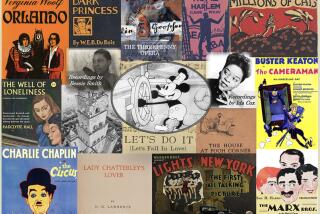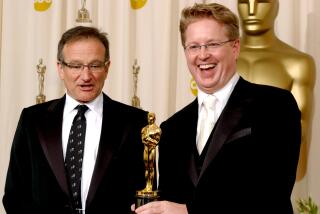Happy birthday, A.A. Milne!
Happy birthday, A.A. Milne! The author of “Winnie-the-Pooh” was born 132 years ago today. Milne brought us Pooh, that silly old bear, and his child companion, Christopher Robin, along with children’s rhymes, and plays, essays and fiction for grown-ups.
Alan Alexander Milne was brought up in England and, as a boy, took classes from a young teacher who was a mentor to him -- the writer H.G. Wells. Milne went to Cambridge, married his wife Daphne, and in 1920 the two of them had a son: Christopher Robin.
Christopher Robin, of course, is also the name of the little boy who pops up in Milne’s work, most notably the classic children’s books “Winnie-the-Pooh” (1926) and “The House at Pooh Corner” (1928). Both were illustrated by E.H. Shepard, who brought Christopher Robin, Pooh, Piglet, Owl, Eeyore, Rabbit, Kanga and Roo to life.
Pooh debuted Christmas Eve 1925 in the London Evening News in Milne’s story “In Which We Are Introduced to Winnie-the-Pooh and Some Bees and the Stories Begin.” It was broadcast on BBC radio on Christmas Day.
By the time the Pooh books were in print, Milne was already a hit. His verse, some of which had been published in the humor magazine Punch, was published in 1924 in the book “When We Were Very Young.” Jingly, funny and easy to remember, they swiftly caught on. His second volume of verse was 1927’s “Now We Are Six.”
‘’No sensible author wants anything but praise,’’ he once said. The praise was focused so much on his children’s books that it’s easy to overlook his plays, writing on pacifism and stories for adults. Some say Pooh was never meant specifically for children.
In the 1960s, Disney purchased the partial rights to Winnie the Pooh, bringing the world to life in animated shorts and cartoons. Eventually Disney secured the complete rights, and Pooh continues to this day in all kinds of Disney media and merchandise.
It’s what Milne would have wanted. He once said, “I suppose that every one of us hopes secretly for immortality; to leave, I mean, a name behind him which will live forever in this world, whatever he may be doing, himself, in the next.”
ALSO:
Shelley Jackson’s winter’s tale
Evelyn Waugh collection donated to the Huntington
Q&A: Olivia Laing on the long love affair between writers and alcohol
Carolyn Kellogg: Join me on Twitter, Facebook and Google+
More to Read
Sign up for our Book Club newsletter
Get the latest news, events and more from the Los Angeles Times Book Club, and help us get L.A. reading and talking.
You may occasionally receive promotional content from the Los Angeles Times.







